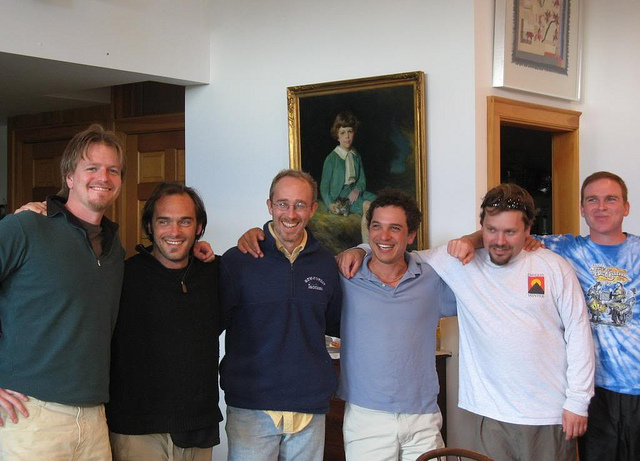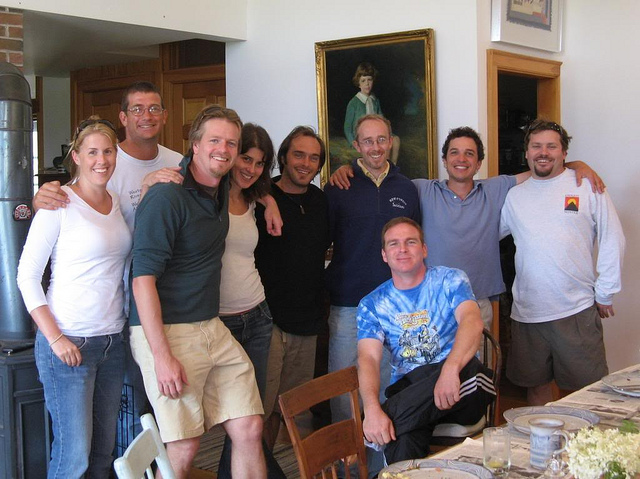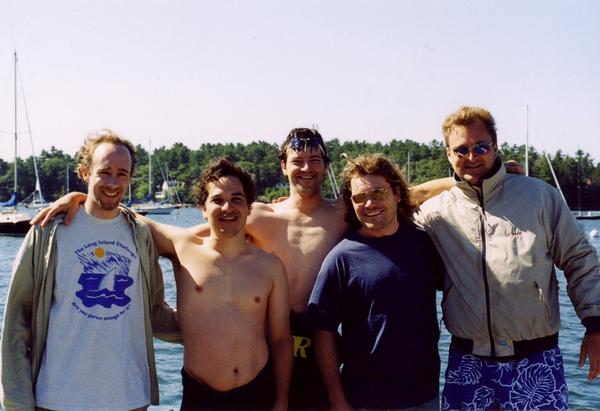Essentially, it was mostly a wash, primarily because of the 70% chance of thunderstorms we heard about for Katahdin after finishing the swim. We realized that with those odds, as JP put it “this would create a 99% chance that the park rangers wouldn’t allow us up Katahdin tomorrow”. So that would’ve been a lot of effort (and expense, a la hotel & food) for naught.
Then it was also raining sporadically as we sat around JP’s pondering what to do next, and after the swim, which I will explain below, we were pretty beat of course and not exactly psyched to ride bikes in the rain. However, we were still sort of psyched to bike around the peninsula. At the same time, Hillary was going to go hiking in Acadia and was encouraging us to come with her instead, so this was the other option. Unfortunately for the bike option, one of Oliver’s bikes, the one I was going to ride, had a hole in the inner tube - so he patched that one, and found another hole, so he patched that one, and found another hole, and so on, and after 4 holes it was getting late and that basically broke the ol’ camel’s back. So it was off to hiking in Acadia.
Which was actually quite nice of course - we hiked around Jordan Pond, up a mountain in the fog, and back down and around to the Jordan Pond restaurant, forget the name, and had a really nice meal there. So that all worked out pretty well.
But of course I digress. The swim was, in two words, f*cking freezing. I would have given my left nut (and very nearly did to frostbite) to have that nifty little wetsuit of yours. Just getting out of the boat at Long Island and picking around the rocks & seaweed while applying generous amounts of Crisco was pretty miserable, though fun in a we’re-totally-nuts kind of way. And wading into the water was more or less hellacious, and then diving in the water was ridiculous, especially the freezing-the-face part. I thought eventually my face would numb up like the rest of my body, but it never really did, so I would just do a few crawl strokes and then do the side- and backstrokes and try to keep my face out of the water. And that was after I had summoned over Sara to give me the can of Crisco so I could re-apply the stuff on my face.
So I lasted maybe half an hour, as did Justin, as the other skinny guy. I got into Sara’s boat, and my teeth started chattering a few minutes later, and didn’t stop until we got to the Becton’s dock another hour or whatever later. So, just in case you were wondering, we were F*CKING COLD. When we caught up to Oliver, who was churning along at about 2 knots I suppose and leading the pack of 2, he yelled to us “how much further ‘til the dock?”, and after we told him, he added “My goodness it’s cold”.
So he finally dragged his numb body onto the dock and sat there shivering for a while, but was very pleased of course to have actually finished. Maybe 15 or 20 minutes later, Ben calmly ascended the ladder, and when asked about the temperature, said “Actually I got used to it pretty fast”, not kidding a smidgeon. This provided much mirth and shocking disbelief for our band of swimming, well, supporters, which at this point consisted of Nate, Hillary, Howie, Vicki, Cuzco the dog, and Hillary’s dog as well as the aforementioned Sara and JP and me.
So we called it a job well done and proceeded to our respective showers, and then onto JP’s house for an absolutely delectable brunch consisting of scrambled eggs, toast with pesto spread, blueberries, and some other stuff which I can’t remember. Abby and The Judge joined us at JP’s, the latter positing the whacky idea of initiating a bike ride that mere mortals might actually be interested in, such as biking around the peninsula and then hiking up Blue Hill, making it a peninsula event that area people & businesses might like to join and/or sponsor. It was also suggested that we start a non-profit associated with the event called “Bibles for Guantanamo” and donate any proceeds to a fund of that purpose in order to show our compassion for the prisoners being abused in our name there. However, some may not exactly see the sarcastic nature of such an endeavor, so it may be shelved in favor of a more broadly inclusive goal such as “Weed for the Fatigued” or something like that (actually this just popped into my head, so should not be considered an official proposal of any sort). No, actually there were a few more suggestions, but I don’t remember them, so we’ll need some help remembering or fresh inspiration if we are to come up with a theme for any fundraiser we may want to endeavor next year.
Anyway, then we proceeded to the 3-hour council meeting in the driveway, an experience perhaps more painful than diving into the Blue Hill Bay water, and you know the rest.



















